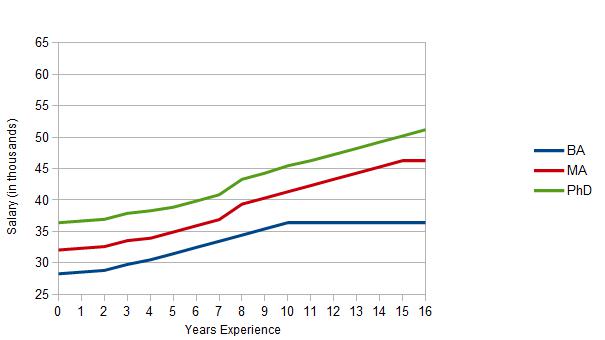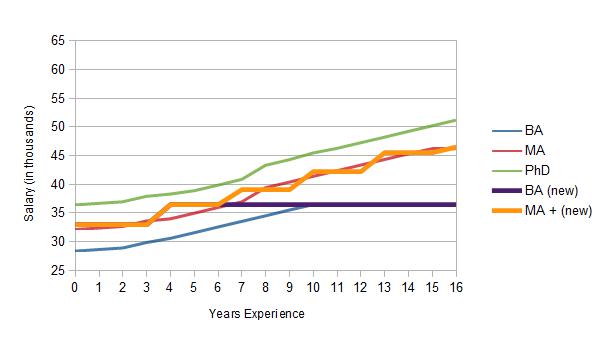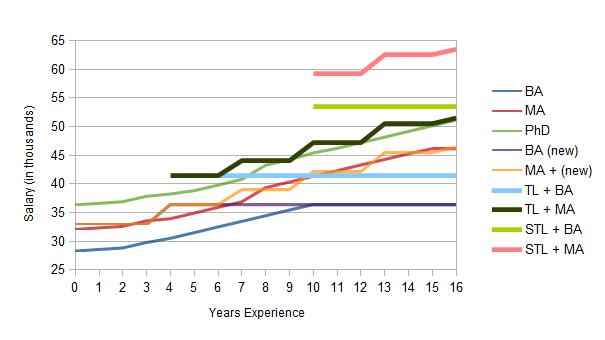Delaware’s ambitious effort to change the way it pays teachers [VIDEO]

Former teacher of the year John Sell works in his office at Sussex Tech. (Avi Wolfman-Arent, NewsWorks)
How can a state keep great teachers in the classroom? Delaware thinks it has an answer.
A banner outside Sussex Technical High School in Georgetown, Delaware proudly declares that John Sell was the state’s teacher of the year in 2013. But if you drop by the school on a typical Thursday morning you won’t find John Sell—teacher extraordinaire—in the classroom.
Instead you’ll see him monitoring the hallways in his new role as assistant principal, a job he took just months after winning teacher of the year—and nearly a quarter century after he started as an English teacher.
“You spend 23 years in one career field, one career path, you think: Is there something else I can do,” Sell says. “And don’t get me wrong, I love teaching English. That’s who I am. I’m an English teacher at heart—probably always will be. But I know there was something else out there I might want to take an attempt at and try to do.”
In the teaching world, opportunities for advancement are limited. The vast majority of educators get regular pay raises based on years of experience and level of education. That leaves ambitious teachers looking for other ways to broaden their career trajectories.
Donna Johnson was once one of those teachers.
Johnson spent nearly a decade teaching high school math, including five years at Sussex Tech.
“I was a very, very engaged and involved educator,” Johnson says. “You name it, I’d done it.”
She was nationally board certified, an eager mentor to other teachers, and a finalist for the Presidential Award for Excellence in Mathematics and Science Teaching. She loved teaching—right up until she left it.
“In terms of professional growth, I think I’d reached a point where I was a bit in neutral,” Johnson says.
There were no promotions to be earned, no bigger roles to tackle. And so in 2006 her ambition took her to Maryland, where she became a district administrator. Four years ago she returned to Delaware as the state board of education’s executive director.
Now she’s one of the key players in an audacious attempt to remake Delaware’s teacher compensation system. One of the primary goals: making sure hungry young teachers stay in the classroom instead of entering administration. In other words, making sure this generation’s Donna Johnson’s don’t turn into Donna Johnson—at least not all of them.
To do that, Delaware will have to undo almost a century of education policy.
What does the current system look like?
Educators in Delaware get roughly 70 percent of their pay from the state. How much they earn is based on two factors: experience and level of education.
A rookie teacher in Delaware with a bachelor’s degree will earn $28,281 from the state (Remember, this is only about 70 percent of the teacher’s total take-home. The rest comes from his or her district). A 16-year veteran of teaching with a doctoral degree gets $51,191.
| YEARS | NO DEGREE | BACH | +15 CREDITS | +30 CREDITS | MAST | +15 CREDITS | +30 CREDITS | +45 CREDITS | PhD |
| 0 | 27,198 | 28,281 | 29,364 | 30,447 | 32,073 | 33,157 | 34,240 | 35,326 | 36,409 |
| 1 | 27,467 | 28,552 | 29,636 | 30,719 | 32,345 | 33,428 | 34,511 | 35,597 | 36,678 |
| 2 | 27,710 | 28,824 | 29,907 | 30,990 | 32,616 | 33,697 | 34,783 | 35,869 | 36,952 |
| 3 | 28,688 | 29,771 | 30,855 | 31,941 | 33,564 | 34,647 | 35,733 | 36,816 | 37,899 |
| 4 | 29,500 | 30,504 | 31,480 | 32,481 | 33,943 | 34,919 | 36,137 | 37,221 | 38,304 |
| 5 | 30,504 | 31,480 | 32,481 | 33,456 | 34,919 | 35,920 | 36,895 | 37,899 | 38,875 |
| 6 | 31,480 | 32,481 | 33,456 | 34,432 | 35,920 | 36,895 | 37,899 | 38,875 | 39,848 |
| 7 | 32,481 | 33,456 | 34,432 | 35,436 | 36,895 | 37,899 | 38,875 | 39,848 | 40,852 |
| 8 | 33,456 | 34,432 | 35,436 | 36,409 | 39,364 | 40,337 | 41,338 | 42,317 | 43,315 |
| 9 | 34,432 | 35,436 | 36,409 | 37,385 | 40,337 | 41,338 | 42,317 | 43,315 | 44,291 |
| 10 | 35,436 | 36,468 | 37,385 | 38,389 | 41,338 | 42,317 | 43,315 | 44,291 | 45,269 |
| 11 | 35,436 | 36,468 | 38,389 | 39,364 | 42,317 | 43,315 | 44,291 | 45,269 | 46,268 |
| 12 | 35,436 | 36,468 | 39,418 | 40,337 | 43,315 | 44,291 | 45,269 | 46,268 | 47,243 |
| 13 | 35,436 | 36,468 | 39,418 | 41,338 | 44,291 | 45,269 | 46,268 | 47,243 | 48,219 |
| 14 | 35,436 | 36,468 | 39,418 | 42,362 | 45,269 | 46,268 | 47,243 | 48,219 | 49,223 |
| 15 | 35,436 | 36,468 | 39,418 | 42,362 | 46,268 | 47,291 | 48,219 | 49,223 | 50,196 |
| 16 | 35,436 | 36,468 | 39,418 | 42,362 | 46,268 | 47,291 | 49,215 | 50,247 | 51,191 |
This system is known colloquially as “steps and lanes.” It is the dominant form of teacher payment across the country, and has been for a long, long time.
“Since the 1920s,” says Frederika Jenner, president of Delaware’s teacher’s union.
Many teachers like steps and lanes, Jenner says. It’s simple, reliable, and familiar.
“I would have walked a picket line for [steps and lanes] 10 years ago,” Jenner says. “I thought, oh my God, this is the be all and end all. This is what it’s been. This is the way it has to be.”
What might a new system look like?
Delaware leaders want to make two major changes to the compensation system.
First, they want to raise starting teacher salaries in order to attract the best candidates.
Second, they want to create hybrid teacher-leader roles that would allow expert educators to take on additional responsibilities while keeping a foot in the classroom. In essence, they want to create a new rung on the educator career ladder so that top teachers can advance without feeling like they have to become administrators.
“Even the kid at McDonald’s has the chance for advancement,” says Jenner, who has since come to support teacher compensation reform. “I think every profession deserves that kind of thing.”
Here’s a proposed alternative salary scale released by a committee that is exploring teacher compensation reform in Delaware.
| YEARS | NO DEGREE | B.A. | M.A.+ | TEACHER LEADER (BA) | TEACHER LEADER (MA+) | SENIOR TL (BA) | SENIOR TL (MA+) |
| 0 | 27,198 | 33,000 | 33,000 | ||||
| 1 | 27,467 | 33,000 | 33,000 | ||||
| 2 | 27,710 | 33,000 | 33,000 | ||||
| 3 | 28,688 | 33,000 | 33,000 | ||||
| 4 | 29,500 | 36,500 | 36,500 | 41,500 | 41,500 | ||
| 5 | 30,504 | 36,500 | 36,500 | 41,500 | 41,500 | ||
| 6 | 31,480 | 36,500 | 36,500 | 41,500 | 41,500 | ||
| 7 | 32,480 | 36,500 | 39,000 | 41,500 | 44,000 | ||
| 8 | 33,456 | 36,500 | 39,000 | 41,500 | 44,000 | ||
| 9 | 34,432 | 36,500 | 39,000 | 41,500 | 44,000 | ||
| 10 | 35,436 | 36,500 | 42,250 | 41,500 | 47,250 | 53,500 | 59,250 |
| 11 | 35,436 | 36,500 | 42,250 | 41,500 | 47,250 | 53,500 | 59,250 |
| 12 | 35,436 | 36,500 | 42,250 | 41,500 | 47,250 | 53,500 | 59,250 |
| 13 | 35,436 | 36,500 | 45,550 | 41,500 | 50,550 | 53,500 | 62,550 |
| 14 | 35,436 | 36,500 | 45,550 | 41,500 | 50,550 | 53,500 | 62,550 |
| 15 | 35,436 | 36,500 | 45,550 | 41,500 | 50,550 | 53,500 | 62,550 |
| 16 | 35,436 | 36,500 | 46,500 | 41,500 | 51,500 | 53,500 | 63,500 |
These teacher leader positions would likely last about three years. In order to qualify for a teacher-leader position, educators would need to be deemed either highly effective or effective on their most recent teacher evaluations. For some educators, those ratings partially reflect how well their students performed on standardized tests. Senior teacher leaders will need to be considered highly effective and have already served a teacher leaders.
One last note: This alternative compensation system would be optional for existing teachers. New teachers, meanwhile, would automatically be placed into the new system.
Can I see all this in chart form?
Of course!
The first chart shows teacher salaries under the old system.

The second chart shows salaries for educators under the proposed, new system. This is only for teachers and other educators who are performing their traditional duties (aka classroom teachers),

The third chart shows what teacher leaders and senior teacher leaders would make under the proposed alternative system.

Why is this important?
A few reasons.
For starters, it’s important because the people in charge believe it’s important. Governor Jack Markell has alluded to teacher compensation reform in each of his last three State of the State addresses. The current administration clearly sees this as a priority—perhaps even a legacy issue.
It’s important also because it would mark the first time a state has tried to remake its teacher compensation system in this way.
Cities like Baltimore and Houston have created new career pathways for teachers, but doing so across an entire state would require a different kind of collaboration—one between urban, suburban, and rural education leaders. If Delaware could pull that off, other states will surely take note.
Perhaps it’s most important, though, because teachers matter.
Research shows a strong tie between teaching quality and student performance. Good teachers drive student achievement. One would imagine, then, that losing good teachers hurts student performance. We don’t know yet whether creating new financial incentives and leadership positions will improve the quality of Delaware’s teaching corps. But the end goal seems a noble one.
Finally, this policy push matters because it could redefine the educator’s role. If successful, it would inject the possibility of advancement into a profession where for 90 years there has been none.
Where does all this stand now?
In July 2014, the Delaware legislature established the Committee to Advance Educator Compensation and Careers (CAECC), which consists of lawmakers and education policy leaders.
Less than a year later, in June 2015, the CAECC issued a set of provisional recommendations. Those recommendations laid out the essential blueprint for an alternative compensation system.
The legislature subsequently created two new working groups; off-shoots of the CAECC that will hash out the details of a final proposal. The Educator Work Group will elucidate the responsibilities of the teacher leaders and how they might be selected. The Technical Advisory Group will dive into the nitty-gritty details, defining terms and troubleshooting any potential problems in the transition to a new system.
What are the challenges ahead?
There are two primary challenges: time and money.
Governor Markell is a fervent supporter of compensation reform, but he has just over a year left in office. It will be tough for him to push such a big reform through during his last legislative session, especially with campaign season in full swing. One wonders, then, if the next governor will want to continue such complicated and time-consuming work.
Then there’s the money, something Delaware doesn’t have a whole lot of.
The state is expected to face a nine-figure deficit next year. In its current form, the alternative teacher compensation system would require an extra $10-15 million each year in taxpayer money. Finding those resources could prove difficult.
WHYY is your source for fact-based, in-depth journalism and information. As a nonprofit organization, we rely on financial support from readers like you. Please give today.


